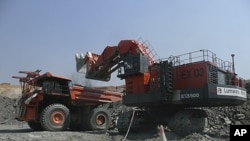A new report from Human Rights Watch titled, "You'll be Fired If You Refuse: Labor Abuses in Zambia's Chinese State-owned Copper Mines" is urging Zambia's new president to live up to his campaign pledges. After his election, Michael Sata promised to ensure that workers in Chinese-owned copper mines are adequately protected. Meanwhile, China defends its practices.
"We found that across the four Chinese-owned copper mines in Zambia, there were persistent labor abuses, particularly in regards to health and safety, long hours of work and anti-union activities," said Matt Wells, with Human Rights Watch in Lusaka, summarizing the more than 100-page report.
The report says safety and labor conditions at Chinese-owned mines in Zambia are worse than at other foreign-owned mines. It also accuses Chinese mine managers of violating Zambian laws by forcing employees to work more than legally allowed.
President Sata recently told Chinese businessmen in Zambia that it is his government's responsibility to make clear what their obligations are. At the same time, he thanked China for its investment.
Wells says workers in Zambia's so-called copper belt were a large part of Sata's power base. The researcher acknowledges what he describes as the Zambian leader's "softening of language," but adds that the next two months are a crucial time to see if President Sata will work for improved conditions for Zambian workers.
"The companies are all starting negotiations right now, through the end of the year, to set the terms for 2012," noted Wells. "And I think how strongly the government is behind the workers will come through, through these negotiations at the end of the year."
In Beijing, Foreign Ministry spokesman Hong Lei said the report is "inconsistent with the facts."
Hong says China expects enterprises to abide by local laws and regulations. He added that China has formulated laws and regulations to ensure that the lawful rights and interests of local employees are protected, although he gave no details.
He says Chinese-African cooperation is based on mutual benefit and equality. He said Chinese companies have promoted employment in Africa and have contributed to economic and social development there.
The Chinese spokesman also said Beijing appreciates Zambia's expressions of desire for continued cooperation.
Human Rights Watch says China's investment in copper mining accounts for 75 percent of Zambia's exports. Wells says the Non-Ferrous Metals Mining Corporation, the state-owned company that oversees China's copper mining operations, has promised to investigate the group's findings.
Rights Group Slams China for Alleged Zambia Mine Abuses
- By Stephanie Ho




